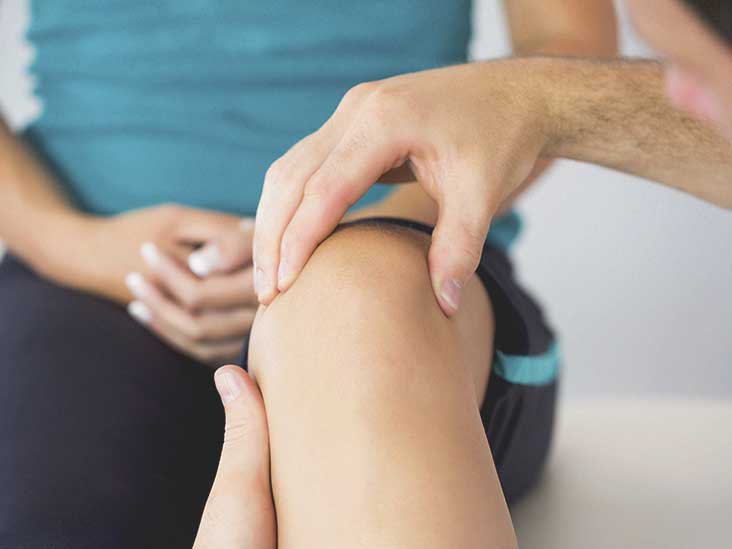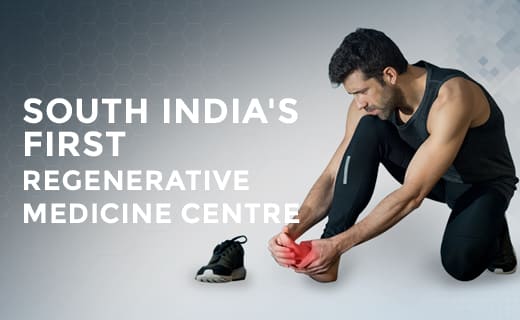Knee Pain And Osteoarthritis Treatment With PRP Therapy
Knee pain can significantly impact your quality of life, hindering your ability to enjoy everyday activities. Whether it's a sudden injury or a chronic condition like osteoarthritis, finding effective relief is crucial.
What is knee osteoarthritis?
Knee osteoarthritis is a degenerative joint disease that occurs when the cartilage in your knee joint wears away, causing the bones to rub together. This friction leads to pain, stiffness, and swelling in your knees.
Osteoarthritis of the knee is a relatively common condition. About 46% of people experience it at some point during their lives. The prevalence of osteoarthritis of the knee is higher in females than in males. People usually begin to experience this condition after turning 40. However, additional factors like trauma or heredity could accelerate the process.

What are the symptoms of knee osteoarthritis?
1. Knee Pain
Knee pain is the most common symptom of knee osteoarthritis. The pain can be intermittent or a constant, mild ache that periodically intensifies. It may worsen with strenuous activity and improve with rest.
- 2. Swelling
- 3. Stiffness
- 4. Warmth and Redness
- 5. Reduced Range Of Motion
As the cartilage wears away, the bones in the knee joint can rub against each other, causing irritation. This can lead to excessive fluid production in the joint, resulting in swelling.
Joint stiffness is a common sign of osteoarthritis. It is often most noticeable in the morning or after periods of inactivity. Gentle movement can help alleviate stiffness within 30 minutes.
Redness and warmth around the knee joint may indicate an infection, which requires immediate medical attention. If you experience these symptoms, especially with swelling, seek emergency medical care.
Osteoarthritis can limit the knee's range of motion, making it difficult to fully bend or straighten the joint, particularly in cases of moderate to severe disease.
Early diagnosis and arthritis treatment can help prevent further damage and improve your quality of life. Schedule a consultation today.
What causes knee osteoarthritis?
Several factors can contribute to the development of knee osteoarthritis. These include:
Age: As we age, the cartilage in our joints naturally wears down, increasing the risk of osteoarthritis.
Genetics: A family history of osteoarthritis can predispose individuals to the condition.
Joint Injury: Past injuries to the knee, such as ligament tears or fractures, can increase the risk of developing osteoarthritis later in life.
Obesity: Excess weight puts additional stress on the knee joints, accelerating cartilage breakdown.
Repetitive Stress: Repetitive activities, especially those involving kneeling or squatting, can contribute to the development of osteoarthritis.
Platelet-Rich Plasma (PRP) Therapy For Osteoarthritis Knee Pain
Orthogen P: A Natural Path to Knee Pain Relief
At Regencare , we offer a cutting-edge solution for knee pain, Orthogen P - a revolutionary platelet-rich plasma (PRP) therapy designed to harness your body's natural healing abilities. PRP is a concentrated solution of platelets, which are blood cells essential for wound healing and tissue repair. By injecting PRP into the affected area, we stimulate the body's regenerative process, leading to:
- 1. Reduced pain and inflammation
- 2.Improved joint function
- 3. Faster healing times
Our Knee pain PRP therapy in Kerala, is a highly effective non-surgical treatment for osteoarthritis. PRP injections can significantly reduce pain, stiffness, and improve joint function.
Benefits of PRP Treatment for Knee Arthritis Pain
PRP (Platelet-Rich Plasma) therapy has emerged as a promising non-surgical treatment for knee arthritis pain. Here are some of its key benefits:
Reduced Pain and Inflammation: PRP injections can help reduce pain and inflammation in the knee joint by stimulating the release of growth factors that promote healing.
Improved Joint Function: By repairing damaged tissues, PRP can enhance joint function and mobility, making everyday activities easier.
Delayed Surgical Intervention: In many cases, Plasma therapy can delay or even eliminate the need for invasive surgical procedures like knee replacement. It offers a viable alternative to traditional surgery.
Minimal Side Effects: As PRP is derived from the patient's own blood, the risk of allergic reactions or other side effects is minimal.
Faster Recovery Time: Compared to traditional treatments, PRP therapy often leads to quicker recovery times.
If you're struggling with knee pain, Regenerative medicine can provide an effective solution for osteoarthritis without any surgery. Book a consultation and we'll assess your condition to determine if PRP is the right treatment for you. Take the first step towards a pain-free life. Contact us today.
FAQ Questions on Knee Pain PRP Treatment
PRP therapy has shown promising results in treating knee pain, especially for conditions like osteoarthritis. Platelets contain growth factors that stimulate tissue regeneration and reduce inflammation. When injected into the knee joint, PRP can help:
- 1. Reduce pain and inflammation
- 2. Repair damaged cartilage
- 3. Improve joint function
- 4. Delay or avoid surgery
Yes, PRP therapy is generally considered safe. Since it uses your own blood, the risk of allergic reactions is minimal.
Typically, the recovery time for PRP knee injections is 2-6 weeks. However, this can vary depending on individual factors and the severity of the condition.
The duration of PRP results can vary depending on various factors. While some patients may experience long-lasting relief, others may require follow-up treatments. It's important to consult with our PRP specialist to discuss your specific case.
Most patients experience minimal side effects, such as mild pain or swelling at the injection site. These side effects usually subside within a few days.
The cost of PRP knee treatment can vary depending on several factors, including the number of treatment sessions, and the specific procedure. It's best to consult with our PRP specialist to get an accurate estimate. Contact us for more information.
The number of PRP sessions required can vary depending on the severity of the condition and individual response to treatment. Typically, a series of 2-3 injections, spaced a few weeks apart, is recommended.
Yes, you can usually walk after a PRP injection. However, it's important to follow specific post-treatment instructions, which may include avoiding strenuous activity for a certain period.
PRP therapy is a non-surgical option that can delay or even avoid the need for knee replacement surgery. However, the suitability of PRP depends on the severity of the condition and individual factors. It's best to consult with our doctor to determine the most appropriate treatment plan.
The success rate of PRP therapy can vary, but it has shown promising results in many cases. Factors such as the severity of the condition, the patient's age, and adherence to post-treatment instructions can influence the outcome.
While PRP therapy has a high success rate, it's not a guaranteed cure. The effectiveness of the treatment can vary depending on individual factors.
Individuals with knee pain due to osteoarthritis, sports injuries, or other degenerative conditions may be suitable candidates for PRP therapy.










